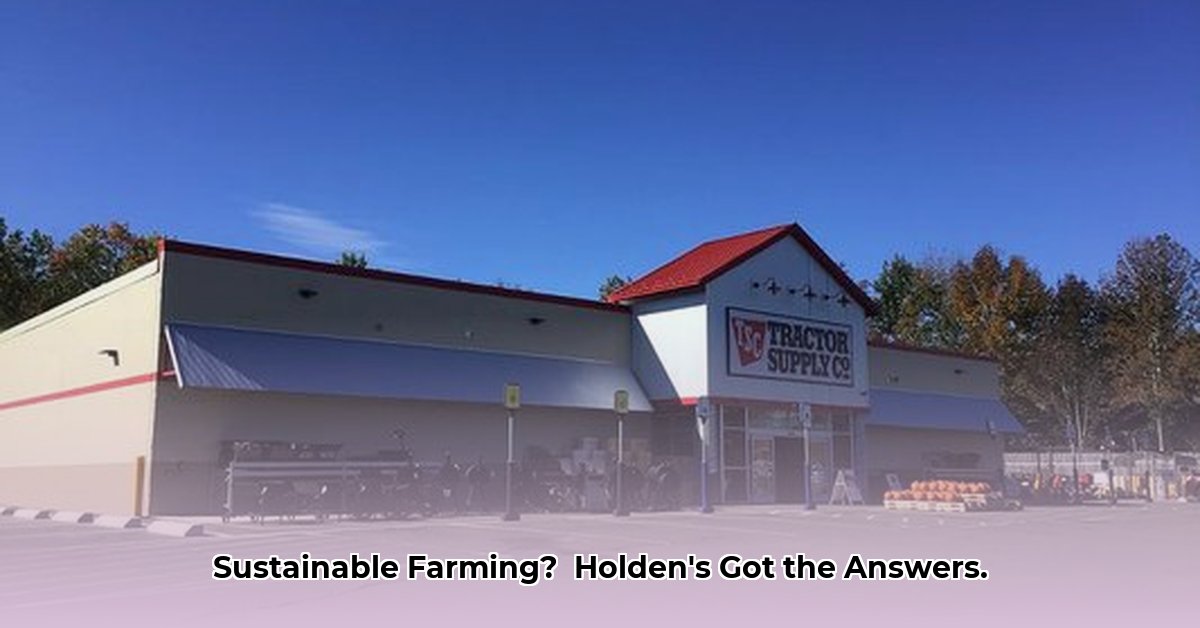
Holden Tractor Supply (HTS) is playing an increasingly significant role in the sustainable agriculture movement. However, its contribution is complex, encompassing both strengths and areas needing improvement. This article explores HTS's current offerings, identifies its limitations, and provides actionable steps for various stakeholders to foster a more sustainable future within the agricultural sector. For more on sustainable tractor technologies, see this helpful resource.
HTS's Offerings and Their Potential for Sustainable Farming
HTS offers a range of products that directly support sustainable agricultural practices. Beyond traditional farm equipment, they provide organic and non-GMO seeds, promoting crop diversification and reducing reliance on monoculture farming. The availability of organic fertilizers and compost helps farmers build healthy soil without harsh chemicals. Further bolstering sustainable practices, HTS offers water-efficient irrigation systems, aiding in responsible water management. These resources benefit both large-scale farms and smaller operations, including home gardeners. But what more can HTS do?
Limitations and Challenges Facing HTS's Sustainability Efforts
While HTS is making progress, several areas demand improvement. Transparency is paramount. Knowing the origin of seeds and the environmental impact of packaging is crucial for ethically minded consumers. Currently, information regarding the origin of organic seeds, farming methods employed, and the transportation carbon footprint remains limited. Improving this transparency would significantly enhance consumer trust and solidify HTS's commitment to sustainability.
To further bolster its image as an industry leader, HTS needs a comprehensive sustainability report detailing its environmental impact and improvement goals. This transparent reporting would showcase accountability and solidify the company’s commitment towards sustainable practices. Additionally, sourcing more products from local suppliers could substantially reduce transportation emissions and stimulate local economies.
Actionable Steps for a Greener Future with HTS
The transition towards sustainable agriculture necessitates a collective effort. Farmers, consumers, HTS management, and environmental NGOs all have crucial roles to play.
For Holden Tractor Supply Management:
- Conduct a Life Cycle Assessment (LCA): A detailed analysis of a product’s environmental impact from origin to disposal is crucial to pinpoint areas for improvement. Publicly sharing these findings demonstrates transparency and accountability.
- Publish a Detailed Sustainability Report: This report should clearly outline HTS’s environmental goals, progress, and challenges related to carbon emissions, waste reduction, water use, and supply chain practices. Regular updates are essential for maintaining stakeholder engagement.
- Partner with Sustainable Agriculture Organizations: Collaborative efforts with experts and advocacy groups provide valuable insights, best practices, and accelerate progress in sustainable agriculture practices.
- Invest in Employee Training: Educating employees regarding sustainable agriculture practices equips them to better advise customers and contribute to HTS's sustainability objectives.
- Expand Sustainable Product Offerings: Continuously explore and introduce new sustainable products to meet the growing demands of environmentally conscious farmers.
For Small-Scale Farmers:
- Utilize HTS Resources Effectively: Take full advantage of HTS's workshops, educational materials, and sustainable farming product offerings.
- Advocate for Supportive Policies: Actively support government policies promoting sustainable agriculture and rewarding environmentally friendly farming practices.
For Consumers:
- Make Informed Choices: Prioritize sustainably sourced products whenever possible. Consumer purchasing power directly influences market trends and demand for sustainable options.
- Demand Transparency: Actively engage with HTS, asking for detailed information about their sustainability initiatives and supply chain practices.
For Environmental NGOs:
- Engage in Constructive Dialogue: Collaborate with HTS, offering expertise and valuable feedback to propel their sustainability efforts.
- Monitor Progress and Accountability: Regularly assess HTS’s progress on sustainability commitments, helping to maintain accountability and encourage continuous improvement.
Conclusion: A Shared Responsibility for a Sustainable Future
Sustainable agriculture is not merely a trend but a crucial necessity. Companies like HTS have a vital role in shaping a greener future. While notable progress is being made, significant opportunities remain for growth and collaboration. By fostering effective partnerships between farmers, consumers, retailers, and environmental organizations, we can collectively cultivate a more sustainable agricultural landscape. The results of such a concerted, collaborative effort will be a healthier, more resilient, and environmentally responsible future.